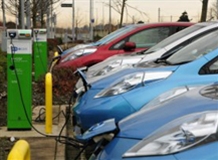Council welcomes €6.4/£5.8m ‘FASTER’ cross-border project funding from the European Union to support the use of Electric vehicles.
18th November 2020

Fermanagh and Omagh District Council has welcomed the recent announcement of an investment of £5.8m in a new electric vehicle charging project that will benefit the Fermanagh and Omagh District.
The FASTER project is funded through the EU’s INTERREG VA programme and will see the installation of 73 electric rapid charging points at areas of defined need across the 3 partner regions of Northern Ireland, the Republic of Ireland and Scotland.
The project will be delivered on a cross border basis by a consortium of partners led by the East Border Region and includes the Sustainable Energy Authority of Ireland, Highlands and Islands Transport Partnership, Ulster University, South West College, University of Strathclyde and Dundalk Institute of Technology.
Speaking about the project, the Chairman of Fermanagh and Omagh District Council, Councillor Chris Smyth said;
“I welcome this significant investment in the Electric Rapid Charging vehicle point network which will help reduce reliance on fossil fuels by encouraging increased use of more environmentally friendly means of powering vehicles.
“It complements the commitment from the Northern Ireland Executive to improving the public electric vehicle charging infrastructure as part of its commitment to climate change action.
“One of the main barriers to greater public use of electric vehicles is a perception that there is a lack of rapid charging stations. I am confident that this significant investment will lead to an increase in charging stations and will add to the growth of the electric vehicle market.
“Climate change is one of the most significant issues facing this and indeed future generations and we must commit to doing what we can to ensuring a more sustainable infrastructure for the future. This investment will also support the UK government’s Road to Zero strategy which has been recently revised signalling its intention to end the sale of new combustion engine-powered cars and vans to 2035.”
Match-funding for the project has also been provided by the Department for Infrastructure in Northern Ireland and the Department for Transport in Ireland, as well as HITRANS and the University of Strathclyde.
